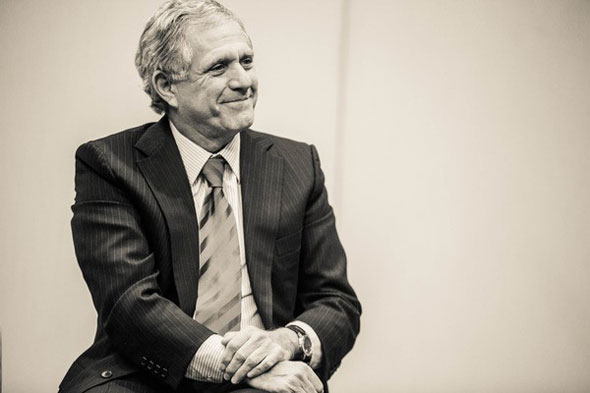 Les Moonves, President and CEO of CBS Corporation, at the Los Angeles World Affairs Council
Les Moonves, President and CEO of CBS Corporation, at the Los Angeles World Affairs Council The entertainment industry is evolving so quickly that Les Moonves, the President and CEO of CBS, says his job is like changing the tires on a car while it is traveling at 80 miles per hour. During his 20 years at CBS Moonves has made it the most-watched network in the US, but he has no idea what it will look like five years from now: “To those who ask, I say, look back five years - we had no Netflix then, no Hulu...”
CBS has to make good content, but that is not enough - “I have to find the audience who want to watch it and get it to them where they want to watch it,” he says. “Walk through a college campus, how many televisions do you see?” 75% of the CBS audience still watch shows in their broadcast time period, but that percentage is shrinking rapidly - “I am chasing after an elusive audience.” The established audience is aging - 60 Minutes, the venerable news magazine program that is now in its 47th year, has viewers with an average age of 63 (not that it doesn’t still make money - “the pharmaceutical companies love us,” says Moonves.)
The future, clearly, is online - which is why in October CBS announced it would put all its content online - for a monthly fee. “The good news about online is that it’s more exact and has targeted ads.” But without good content, nothing works. “We have a saying at CBS - ‘wireless is useless if you are hitless’”.
When asked how good shows are identified, Moonves said “it is all about relatability. I only put on shows that I like - it has got to hold your attention early and often... I think I have ADD and that helps me in the business - I have to be engaged.” He also said that they pay attention to who the writer and the producer of the show is - “it’s about who can keep it up, show after show, season after season - we have a lot of good pilots, but not a lot of good series.”
But when a good series hits, it remains a money-spinner for a long time - both in the US and overseas. NCIS is shown in 220 markets around the world. I Love Lucy is set to earn $15 m for CBS this year - notwithstanding the fact that it was last shot in 1957. “Content is evergreen,” he said.
Moonves also conceded that bundling of cable channels made little sense, since consumers pay to receive some 150 channels when the average household only watches 12-15 channels. “You are paying for a lot of garbage,” he said, in answer to a questioner who asked how he could avoid paying for the Kardashians in his cable service. He also agreed with DIRECTV CEO Mike White, who criticized the high cost of content, particuarly sports programming, when he addressed LAWAC in October. “Mike has a valid point...sports rights have got very out of hand.”
On news programming, Moonves said the CBS News Division “barely makes any money - we consider it semi-pro bono television.” He said he was proud to have a news division, “but we aren’t making much money off it and my job is to watch our stock price.”
On the international front he said that "Latin America is suddenly exploding for us, as is Eastern Europe," but CBS is barely making any inroads into China. “China is very restrictive. The problem facing us there is piracy. The Big Bang Theory is huge in China, but we don’t get a penny for it.”
But with revenues last year of $15 bn and 220 other markets to operate in, CBS can afford to be patient for the Chinese market to open up to US television. Maybe they will even start screening I Love Lucy in Beijing.
